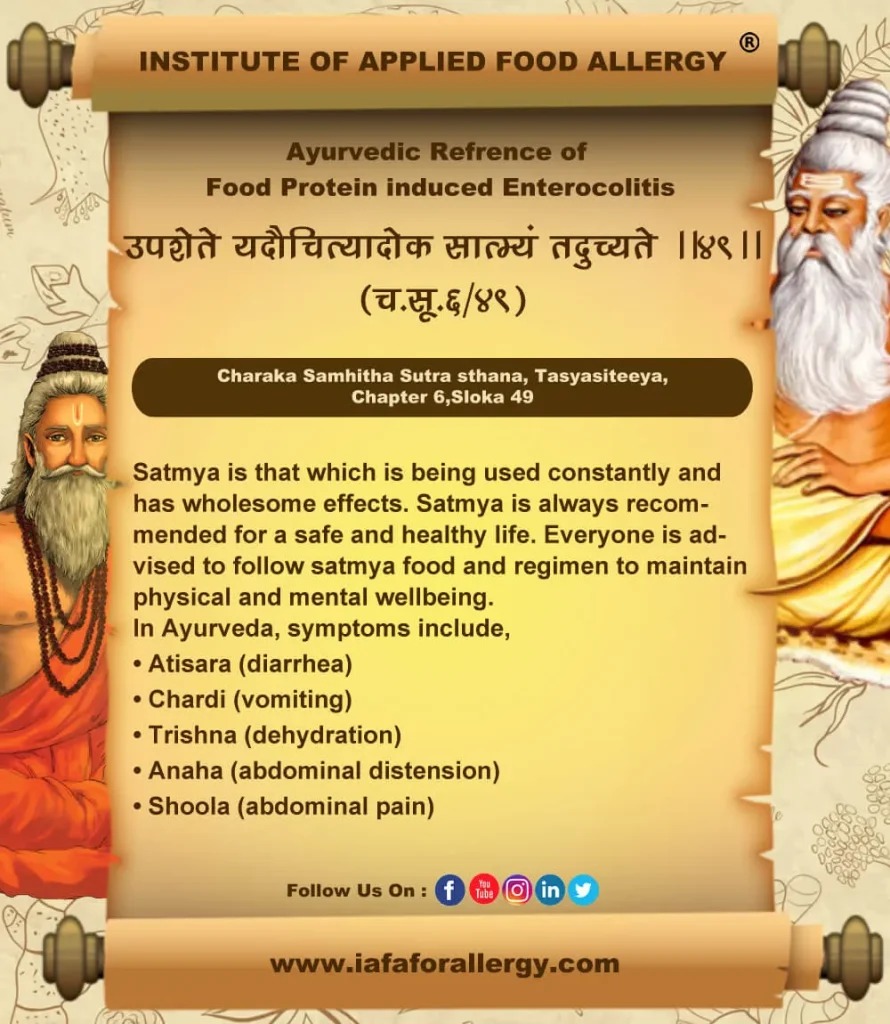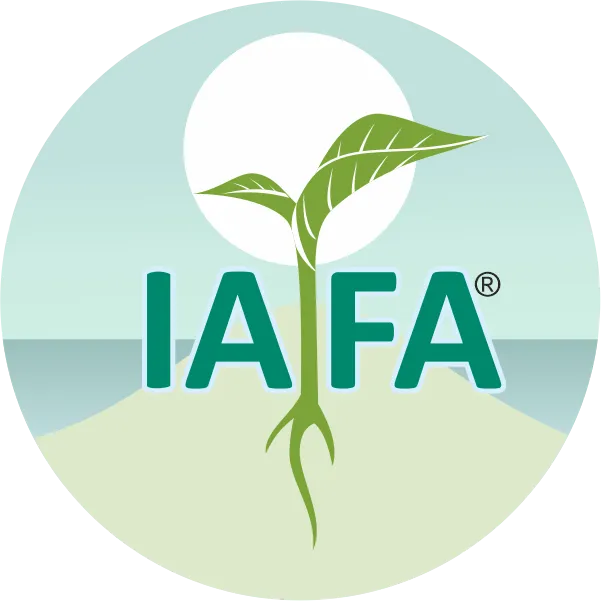On This Page
Introduction
The non-IgE-mediated gastrointestinal hypersensitivity that primarily affects young children and infants is known as FPIES (Food Protein-Induced Enterocolitis Syndrome. A few hours after the ingestion of certain food proteins like soy protein, grains protein, cow milk, etc. symptoms of FPIES start appearing like severe vomiting, dehydration, diarrhea, etc. As Food Protein-Induced Enterocolitis Syndrome (FPIES) is non-IgE mediated it does not involve immediate hypersensitivity like hives.
In Ayurveda, it can be understood through intolerance or non-adaptation (Asatmyata) which refers to the inability of the individual to tolerate a specific substance. This intolerance is the result of digestive fire imbalance (Agni Dusthi), Vata, Pitta imbalance, and toxin formation (Ama) in the body and shares similarities with Malabsorption syndrome (Grahani Roga), Atisara.
Along with this food proteins that trigger the symptoms of Food Protein Induced Enterocolitis Syndrome (FPIES) align with the concept of incompatible food (Viruddha Ahara). Due to weak digestive fire and immature digestive system, milk-fed infants (Ksheerada) and milk and solid food-introduced infants (Ksheer-Anaada) are affected by this syndrome.
Here, you will find the Ayurvedic treatment for Food Protein Induced Enterocolitis Syndrome (FPIES) like detoxification therapy, Single Herbs, rejuvenation therapy Diet and Lifestyle modification, etc. The treatment helps in balancing the vitiated Dosha, and digestive fire and removes toxins from the body which will certainly help to treat Food Protein Induced Enterocolitis Syndrome (FPIES).
What is Food Protein-Induced Enterocolitis Syndrome (FPIES)?
Gastrointestinal food hypersensitivity that is non-IgE-mediated and primarily affects infants and young children is known as Food Protein Induced Enterocolitis Syndrome (FPIES). This syndrome does not show immediate symptoms as it is non-IgE mediated, and symptoms appear after two to six hours after ingestion of trigger food.
Food Protein Induced Enterocolitis Syndrome (FPIES) – As Per Ayurveda
In Ayurveda Food Protein Induced Enterocolitis Syndrome (FPIES) can be understood through intolerance or non-adaptation (Asatmyata) which refers to the inability of the individuals to tolerate a specific substance. This intolerance is the result of digestive fire imbalance (Agni Dusthi), Vata, Pitta imbalance, and toxin formation (Ama) in the body and shares similarities with Malabsorption syndrome (Grahani Roga), Atisara.
Along with this food proteins that trigger the symptoms of Food Protein Induced Enterocolitis Syndrome (FPIES) align with the concept of incompatible food (Viruddha Ahara) and show symptoms like recurrent vomiting, watery diarrhea, dehydration, weight loss, low blood pressure, hypothermia, etc.
Who Gets Affected by Food Protein-Induced Enterocolitis Syndrome (FPIES)?
Due to weak digestive fire and immature digestive system, milk-fed infants (Ksheerada) and milk and solid food-introduced infants (Ksheer-Anaada) are affected by this syndrome. Symptoms of FPIES usually start appearing within the first year of life.
Peak onset is between 4 to 9 months of age when grains like rice, oats, cow milk, etc are introduced to the infant. Adults are less commonly affected by FPIES, but few cases are reported, and it is hard to diagnose Food Protein-Induced Enterocolitis Syndrome (FPIES) in adults as it mimics other gastrointestinal conditions like food poisoning.
Are Breastfed Infants Affected by Food Protein-Induced Enterocolitis Syndrome (FPIES)?
Breastfed infants are rarely affected by FPIES unless exposed to some trigger protein through the mother i.e. breast milk.
How Common is Food Protein-Induced Enterocolitis Syndrome (FPIES)?
In the 1960s, the first cases of infantile FPIES in cow’s milk, soy, or rice were reported in the literature.
As per the survey, the prevalence of Food Protein-Induced Enterocolitis Syndrome (FPIES) in infants is 0.015 to 0.7 %. As per a survey in the United States, the prevalence of acute FPIES in adults is 0.22% while in children it is 0.51 %. The most common food that affects FPIES in adults as per the survey is seafood while in infants cow’s milk, rice, avocado, etc. are the culprits.
Types of Food Protein-Induced Enterocolitis Syndrome (FPIES)
Based on onset, duration, and severity FPIES are classified into 4 types:-
- Acute FPIES
- Chronic FPIES
- Atypical FPIES
- Adult onset FPIES
1. Acute FPIES: The onset of acute FPIES occurs usually by a single exposure and within two to six hours after ingesting the trigger food with symptoms like repetitive vomiting, lethargy, paleness, etc. In severe cases, it may lead to low blood pressure and shock. Common triggers for acute EPIES are soy, rice, and cow’s milk. Fish, egg.
2. Chronic FPIES: Chronic FPIES usually occur with repeated exposure to trigger food for a long time. When infants are fed with trigger food regularly the symptoms start appearing like frequent vomiting, poor weight gain, malnutrition, failure to thrive, etc.
3. Atypical FPIES: Atypical FPIES, is a rare type in which IgE antibodies are also present and often mistaken with other GIT disorders as it mimics the symptoms of food poisoning.
4. Adult onset FPIES: This is like atypical FPIES, mistaken with other gastrointestinal disorders but IgE antibodies are not involved in it.
Causes of Food Protein Induced Enterocolitis Syndrome (FPIES)
- Improper or delayed food introduction
- Immature gut immunity or the immune system of infants is still developing
- Immature T-cell-mediated response
- Imbalanced gut microbiota
- Intake of the trigger food
Causes of Food Protein Induced Enterocolitis Syndrome (FPIES) – As Per Ayurveda
- Weakened tissue metabolism (Dhatv Agnimandya)
- Incompatible food (Viruddha Ahara): The intake of food that does not suit individual Prakriti (constitution).
- Weak digestive fire (Agnimandya): Weak digestive fire (Mandagni) leads to hypersensitivity by improper metabolism of proteins.
- Processed food or contaminated food intake (Dushita Aahara)
- Genetic predisposition (Beeja Dosha)
Symptoms of Food Protein Induced Enterocolitis Syndrome (FPIES)
- Repetitive vomiting
- Profuse diarrhea
- Distress in infants and children
- Severe abdominal pain
- Feeding aversion
- Food refusal
- Pale skin
- Lethargy
- hypotension
- Hypothermia
- Breathing difficulties
- Failure to thrive in infants
Symptoms of Food Protein Induced Enterocolitis Syndrome (FPIES) – As Per Ayurveda
Gastrointestinal Symptoms (Anavaha Stroto Dushti Lakshana / Rupa):-
- Repeated projectile vomiting within 1-3 hrs. of consuming trigger-causing food (Atyagni Janana Chardi)
- Diarrhea (Atisara) that is watery, profuse sometimes with mucus
- Abdominal pain (Udara Shool)
- Food stagnation and indigestion (Ajeerna)
Systemic Symptoms (Sharirika Lakshana):-
- Shrama and Trishna (Dehydration)
- Failure to thrive in infants (Daurbalaya)
- Lethargy and weakness (Bala Kshaya)
- Respiratory issues like asthma, and hiccups (Shwasa and Hikka)
- Red rashes, eczema (Tvaka Vikara)
Ayurvedic Reference of Food Protein-Induced Enterocolitis Syndrome (Asatmyaja Rogas)

Diagnosis of Food Protein Induced Enterocolitis Syndrome (FPIES) – As Per Ayurveda
For diagnosis, the Ayurvedic physician will do a detailed examination and observation of the patient (Roga-Rogi Pariksha) by tenfold examination (Dasha Vidha Roga Pariksha). Examination of affected channels (Strotas) should be conducted properly. Along with this detailed analysis of the causative factors, pre-symptoms, progression, etc. will be done.

“Dr. Gupta’s IAFA provides very effective treatment for food protein-induced enterocolitis syndrome (FPIES). Institute of Applied Food Allergy® offers successful Ayurvedic Management for Food Protein-Induced Enterocolitis Syndrome. IAFA® is committed to providing the best care with compassion and excellence in service”.
The skill to heal, The spirit to care!!!…For your better health, Reach Dr. Gupta’s IAFA.
– Dr. Sahil Gupta (B.A.M.S., M.H.A.)
- Ayurvedic Allergy Specialist
- CEO & Founder of IAFA®
At last, Easier FPIES Management

Trusted by
More than 90,000 Patients

Convenient
at-Home Treatments

9.2 / 10
Customer Satisfaction Score
Food Protein Induced Enterocolitis Syndrome Ayurvedic Treatment
The Food Protein Induced Enterocolitis Syndrome Ayurvedic Treatment mainly focuses on balancing the Dosha, digestive fire (Agni), cleansing of channels (Strotas), toxins (Ama) elimination through Shodhana (purificatory), Shamana (palliative), dietary regulation (Pathya- Apathya), lifestyle modification, etc.
IAFA Ayurveda provides effective purificatory and palliative therapies for the successful management of Food Protein Induced Enterocolitis Syndrome (FPIES). Dr. Gupta’s IAFA is the perfect destination for treating FPIES as well as other types of diseases. The Ayurvedic approach that is used to treat Food Protein Induced Enterocolitis Syndrome (FPIES) is as follows:-
Detoxification Therapy (Shodhana Therapy) for FPIES
- Emetic therapy (Vamana) – For expelling excessive Kapha controlled therapeutic vomiting is done. In Chronic cases of FPIES mild emetic therapy (Mridu Vamana) can be done for this honey (Madhu) and warm water, etc. can be used.
- Purgation therapy (Virechana) – Therapeutic purgation is done in patients with the help of various herbs to cleanse the body. In Infants and children, strong purgation (Tivra Virecahan) is not given but mild purgation (Mridu Virechana) can be given with the help of raisins (Draksha).
- Medicated Enema Therapy (Basti) – In this process, medicated oil or decoctions are administered through the rectum. When the colon is affected in the chronic case of FPIES mild decoction enema (Niruha Basti) can be given with decoction like Dashmoola decoction, etc.
Herbs for Food Protein Induced Enterocolitis Syndrome (FPIES)
Various digestive strengthening (Deepana-Pachan) herbs for Food Protein Induced Enterocolitis Syndrome (FPIES) Ayurvedic Treatment includes Shunthi (Zingiber officinale), Chitraka (Plumbago zeylanica), Trachyspermum ammi (Ajamoda), etc.
Along with these gut-healing herbs or anti-inflammatory herbs like Guduchi (Tinospora cordifolia), Kutaja (Holarrhena antidysenterica), etc. Nutrient restoring herbs like Draksha (Vitis vinifera), Dadima (Punica granatum), etc are used. These herbs are considered the top herbs that can be used in the treatment of FPIES.
Gem Therapy for Food Protein Induced Enterocolitis Syndrome (FPIES)
As per Vedic Astrology, Few stones are recommended to wear in Food Protein Induced Enterocolitis Syndrome (FPIES). These stones can be worn after proper consultation with an astrologer as per your birth date, Zodiac sign, etc. to get only benefits.
As per astrology, Emerald (Panna), Red Coral (Moonga), and Yellow Sapphire (Pukhraj) can be worn as per your natal chart if you are suffering from Food Protein Induced Enterocolitis Syndrome (FPIES).
Diet and Lifestyle Guidance (Pathya-Apathya) for Food Protein-Induced Enterocolitis Syndrome (FPIES)
According to Ayurveda, if your diet is correct then medicine is of no use because a good gut is considered as the basis of a healthy individual. So, by giving attention to our daily diet, we not only get relief from the diseases from which we suffer but also avoid the upcoming diseases. Below we mention some dietary and lifestyle guidelines that one can follow for FPIES:-
What to Do (Pathya) in FPIES?
For infants more than 6 months along with breast milk below mentioned diet is recommended in FPIES:-
- Rice water (Tandulodaka) can be given strength digestion, which prevents dehydration.
- Easily digestible green pulse (Moong Dal) water should be given.
- Parents who want to give non-veg to infants can give homemade bone broth for gut healing.
The infants who start taking solid and semi-solid can include the below-mentioned diet:-
- Steamed and mashed vegetables like sweet potatoes, pumpkin, carrot, etc.
- Banana mash
- Rice porridge
- Ragi porridge
- Homemade ghee can be added to the diet
- Hydrating drinks like coconut water, etc.
- Ajwain water should be given to reduce colic and bloating.
- For relieving indigestion and gas Hing mixed with warm clarified butter (Ghee) should be applied on the navel.
What to Avoid (Apathya) in FPIES?
- Avoid heavy grains like barley, wheat, millet, etc.
- Common triggers like soy products and cow’s milk should be avoided.
- Spicy and fermented food should be avoided.
- Irregular meal habits should be avoided.
- Avoid cold food.
Yoga Asanas for Food Protein-Induced Enterocolitis Syndrome (FPIES)
Various Yoga Asanas like Child pose (Balasana), Thunderbolt poses (Vajrasana), Wind relieving pose (Pawanmuktasana), Deep breathing techniques (Pranayama specific Bhramari Pranayama), Meditation, etc. can be used in FPIES.
These Yogic Asanas help in reducing bloating, relieve digestive discomfort, aid digestion, relieving stress, enhance skin health, improve metabolism, detoxification, etc.

Frequently Asked Questions
Question: How are FPIES Different from Other Allergies?
Answer: FPIES is a non-IgE-mediated food allergy; unlike other allergies that IgE mediated it does not cause immediate allergic symptoms like hives, swelling, anaphylaxis, etc.
Question: Who is at Risk of Developing FPIES?
Answer: Infants and young children are at risk of developing FPIES.
Question: What are the Common Trigger Foods for FPIES?
Answer: Cow’s milk, soy, oats, eggs, sweet potatoes, peas, etc are the common triggers for FPIES.
Question: How to Treat FPIES Naturally?
Answer: By using various detoxification therapies, digestive strengthening herbs, rejuvenation therapy, etc. one can treat FPIES naturally.
References
- Sabnis M. Viruddha Ahara: A critical view. Ayu. 2012 Jul; 33 (3): 332- 6. doi: 10. 4103/ 0974- 8520. 108817. PMID: 2372- 3637; PMCID: PMC- 3665091.
- Bartnikas, L. M., Nowak-Wegrzyn, A., Schultz, F., Phipatanakul, W., & Bingemann, T. A. (2021). The Evolution of FPIES: From a Diagnosis That Did Not Exist to a Condition in Need of Answers. Annals of Allergy, Asthma & Immunology: Official Publication of the American College of Allergy, Asthma, & Immunology, 126 (5), 489. https:// doi. org/ 10. 1016/ j. anai. 2021. 01. 001.
- Järvinen KM, Nowak- Wegrzyn A. Food protein-induced enterocolitis syndrome (FPIES): current management strategies and review of the literature. J Allergy Clin Immunol Pract. 2013 Jul- Aug; 1 (4): 317- 22. doi: 10. 1016/ j. jaip. 2013. 04. 004. Epub 2013 May 31. PMID: 2456- 5536.
- Leonard SA, Pecora V, Fiocchi AG, Nowak-Wegrzyn A. Food protein-induced enterocolitis syndrome: a review of the new guidelines. World Allergy Organ J. 2018 Feb 7; 11 (1): 4. doi: 10. 1186/ s40413- 017- 0182- z. PMID: 29441147; PMCID: PMC- 5804009.
- Mathew M, Leeds S, Nowak- Wegrzyn A. Recent Update in Food Protein-Induced Enterocolitis Syndrome: Pathophysiology, Diagnosis, and Management. Allergy Asthma Immunol Res. 2022 Nov; 14 (6): 587- 603. doi: 10. 4168/ aair. 2022. 14. 6. 587. PMID: 36426394; PMCID: PMC- 9709682.
- Lisann L, Song Y, Wang J, Ehrlich P, Maitland A, Li XM. Successful prevention of extremely frequent and severe food anaphylaxis in three children by combined traditional Chinese medicine therapy. Allergy Asthma Clin Immunol. 2014 Dec 20; 10 (1): 66. doi: 10. 1186/ s13223- 014- 0066- 5. PMID: 25670938; PMCID: PMC- 4322482.
- Nomura, Ichiro & Morita, Hideaki & Hosokawa, Shinichi & Hoshina, Hiroaki & Fukuie, Tatsuki & Watanabe, Misa & Ohtsuka, Yoshikazu & Shoda, Tetsuo & Terada, Akihiko & Takamasu, Tetsuya & Arai, Katsuhiro & Ito, Yushi & Ohya, Yukihiro & Saito, Hirohisa & Matsumoto, Kenji. (2011). Four distinct subtypes of non-IgE-mediated gastrointestinal food allergies in neonates and infants are distinguished by their initial symptoms. The Journal of Allergy and Clinical Immunology. 127. 685- 8. e1. 10. 1016/ j. Jaci. 2011. 01. 019.
Seek Expert Advice
Dr. Gupta’s IAFA is a pioneering center in the Ayurvedic management of various diseases including Food Protein Induced Enterocolitis Syndrome (FPIES). IAFA ensures good results and relief to all suffering from the distressing effects of FPIES.
For Personalized Treatment of Food Protein Induced Enterocolitis Syndrome (FPIES), Book Your Appointment Now!!!
Was this Page Helpful?
So, IAFA’s Root-Cause Treatment of Food Protein-Induced Enterocolitis Syndrome (FPIES) is Just 3 Steps Away!

01. Connect With Us
Share your history of illness or Book your appointment

02. Consult With Us
Dr. Gupta a certified Ayurvedic Allergist Consultant

03. Root Cause Treatment
Get an accurate diagnosis, medicines, diet & lifestyle change
Real Case Studies – Successfully Treated Patients
Real Case Studies of Successfully Treated Patients from All Around the World by IAFA Ayurveda®

5-Year-Old Shih Apso Dog Recovered from Canine Peripheral Neuropathy – A Case Study
This case study presents a 5-year-old Shih Tzu-Lhasa Apso crossbreed dog (pet)…

9 Year Old Female Patient Recovered from Chronic Allergic Bronchitis – A Case Study
This case study presents a 9-year-old female patient who has successfully recovered…

12-Year-Old Child Recovered from Sun Allergy and Polymorphous Light Eruption (PMLE) – A Case Study
This is a case study of a 12-year-old child who has successfully…

40-Year-Old Female Patient Recovered from Dyshidrotic Eczema and Onychomycosis – A Case Study
This case study highlights the successful recovery of a 40-year-old female patient…
Read More Articles

Polymorphous Light Eruption (PMLE)
Discover Ayurvedic treatment for Polymorphous Light Eruption (PMLE). Learn about its causes,…

Mast Cell Diseases
Discover Ayurvedic treatment for Mast Cell Diseases, including types, causes, symptoms, and…

High Immunoglobulin-E (IgE) Levels
Discover Ayurvedic treatment for high Immunoglobulin-E (IgE) levels. Learn about the causes,…








